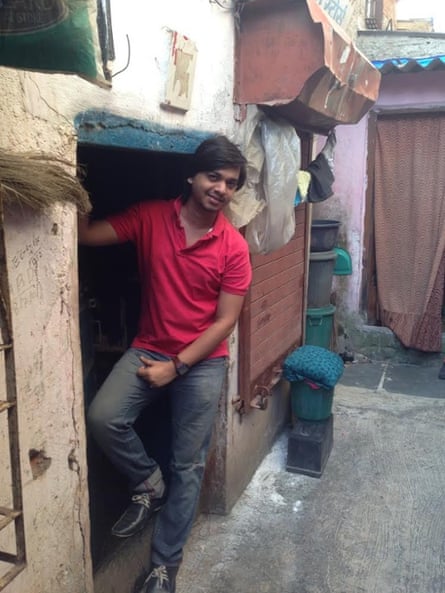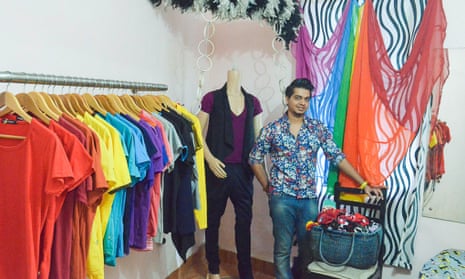A few years ago, the trendy Mumbai shopping district of Bandra lost the gay-friendly icon of Azaad Bazaar when high rental costs forced it to close. Now, the city has lost exclusive gay fashion store D’kloset – and this time it is not only rising commercial rents that spelled doom for the store – but also a judgement by the Indian supreme court to criminalise gay sex.
When the supreme court reversed a Delhi high court judgment that legalised consensual gay sex, it reinstated Section 377 of the penal code – a provision introduced by the British colonial government in 1861 which criminalises what it calls “carnal intercourse against the order of nature” and effectively bans same-sex relationships.
Entrepreneur Inder Vhatwar – who worked his way up from the Golibar slum to found D’kloset as ‘India’s first PINK retail for men’ – says he and his customers now live in fear of being targeted by Hindu extremist groups.
Vhatwar says his currently landlord has refused to renew his lease on the store, and he has already been turned down by two potential landlords. “They clearly told me that they didn’t want any issues at the store, because Section 377 made us criminals”, he said.
“I never thought that one verdict could affect my life so much”, Vhatwar added. “I support myself and my family with the revenue of the store … The owner did not know about the gay concept before, so there was no problem.”
Bandra seems to be the Soho of Mumbai. pic.twitter.com/IMYiIXFykm
— Stephen Fry (@stephenfry) March 1, 2013
Since D’kloset shut its doors a month ago, Vhatwar has been selling clothes to regular customers from his apartment. But it is not just finances that worry Vhatwar: the ban on same-sex relationships affects his daily life.
“I stay with my partner in a rented apartment and after this [reinstatement of Section 377], we lead a low-profile life. We have stopped going out a lot and invite friends home instead.” He says another gay couple were evicted by their landlady, and tales of blackmail are rife.
A few years ago, none of this was a problem for Vhatwar. After the Delhi high court struck down Section 377 of the Indian Penal Code in 2009 for violating fundamental human rights, gay culture in India became more open – with pride marches, gay magazines, dating sites and gay-friendly stores making an appearance.
When some of Vhatwar’s friends wanted to invest in a start-up in Mumbai, he floated the idea of a gay fashion store that would offer the community a place to shop without any inhibitions – sparked by his own negative experience shopping in the city’s malls. “When I asked for skinny jeans, store representatives would bring the jeans from the women’s section and pass snide remarks.”
He opened D’kloset in December 2010 with stock from Bangkok and China, later moving in to clothes production.

At first Vhatwar didn’t tell his family about D’kloset – but when a front-page news article featured his shop, he called his sister and told her to show the family. They were overjoyed.
“Looking back at the start of my life in Golibar, it’s painful to realise that I never really had a childhood,” said Vhatwar. “My father died when I was three years old, and my earliest memories were of my mother struggling to bring up three children in a slum where even clean water was considered a luxury. My passion has enabled the entire family to come out of the slum and stay in a better locality.”
Vikram Doctor, one of the organisers of Gay Bombay, which aims to create safe spaces for the city’s gay community, said: “Stores like Azaad Bazaar and D’kloset used to be a meeting place for the young LGBT crowd. Running an LGBT store is difficult in a city where even a normal boutique finds it hard to survive. It’s a landlord’s market. If there is any sort of controversy, they will definitely say no. Further, LGBT stores across the world are shutting down due to the presence of e-commerce websites like Amazon. We need more cultural centres which are funded.”
“The price-point is definitely the USP of the store,” said 22-year-old customer Meet Parekh. “The clothes are more affordable than those from other boutiques … And the fact that the store is run by a gay guy makes members of the gay community automatically shed their inhibitions.”
Vhatwar says Bollywood stars came to his shop and gay tourists from all over the country used to visit. Last year British comedian Stephen Fry paid a visit to D’kloset while filming his BBC documentary Out There.
And some prominent Mumbaikars continue to back Vhatwar. “Inder is a self-made person and has come up in life through immense challenges”, said Bollywood actress Celina Jaitly. “It is absolutely not acceptable that he cannot continue his dreams and this amazing concept of D’kloset because of an archaic law.”
This article was commissioned as part of the Guardian’s Citizen Reporting Programme

Comments (…)
Sign in or create your Guardian account to join the discussion